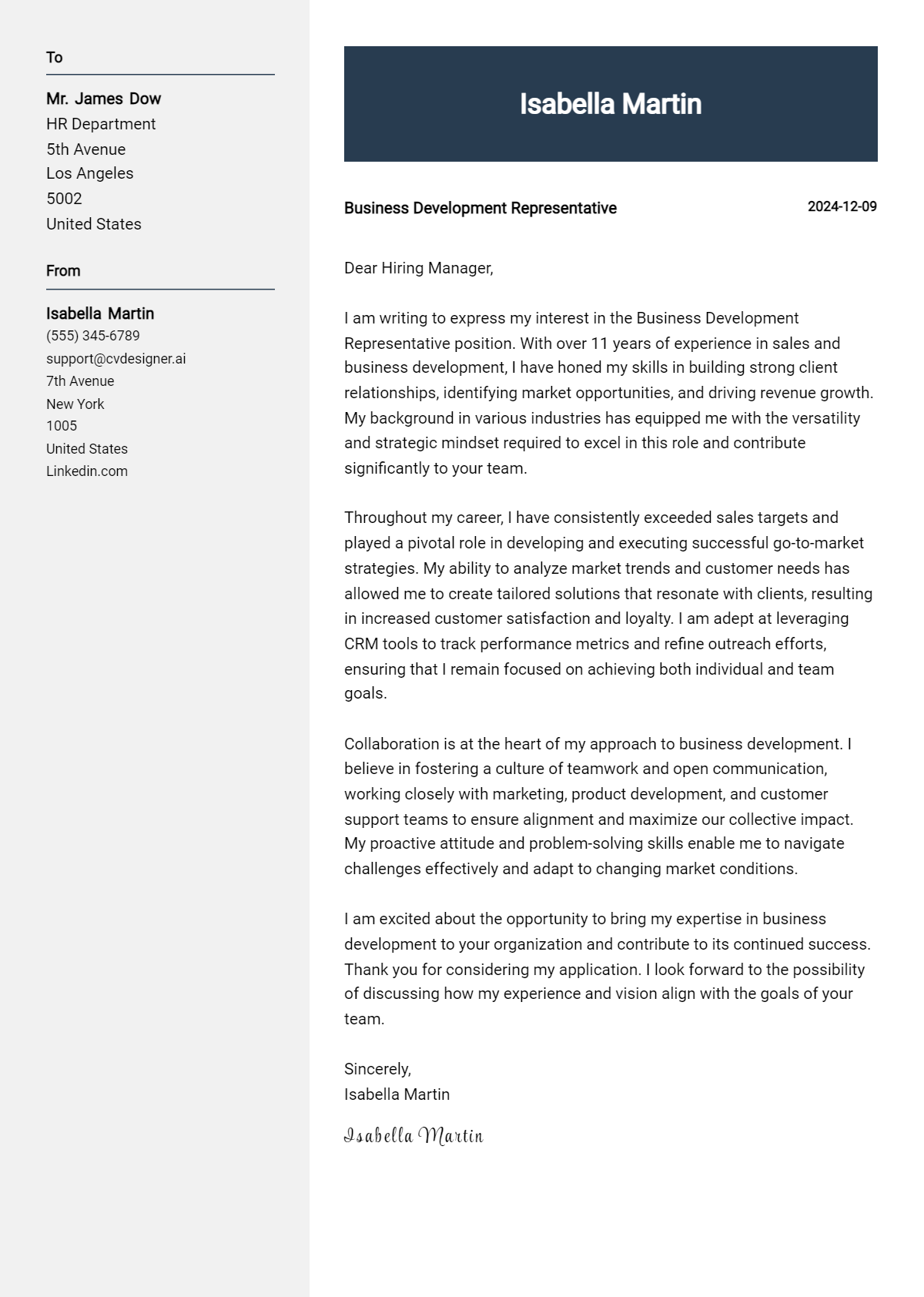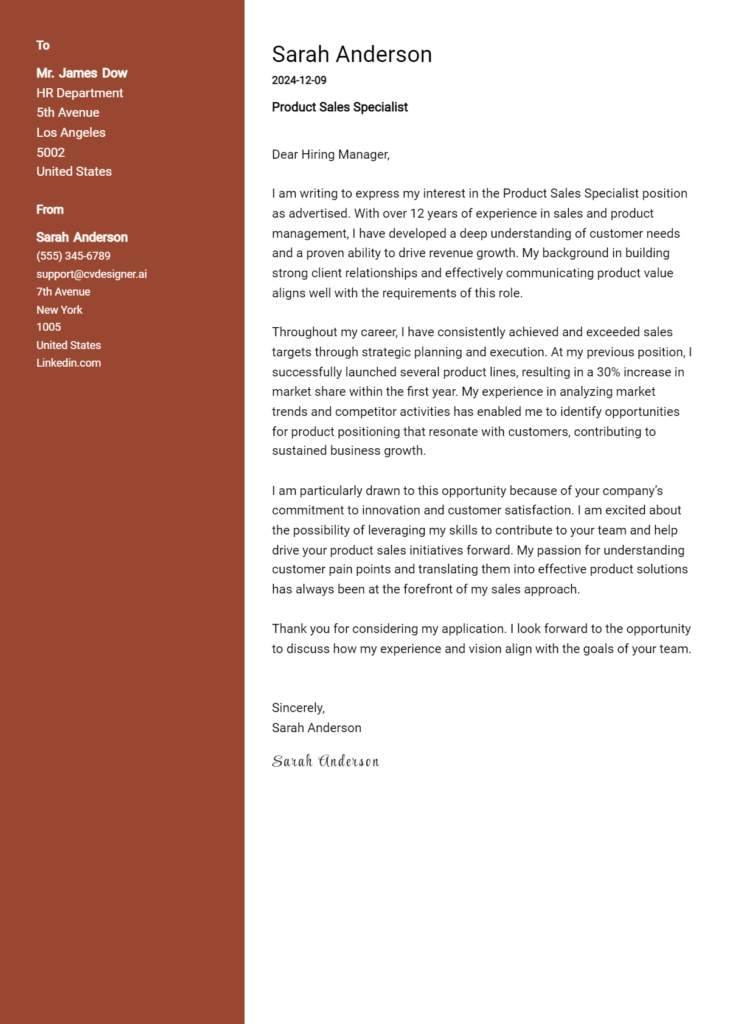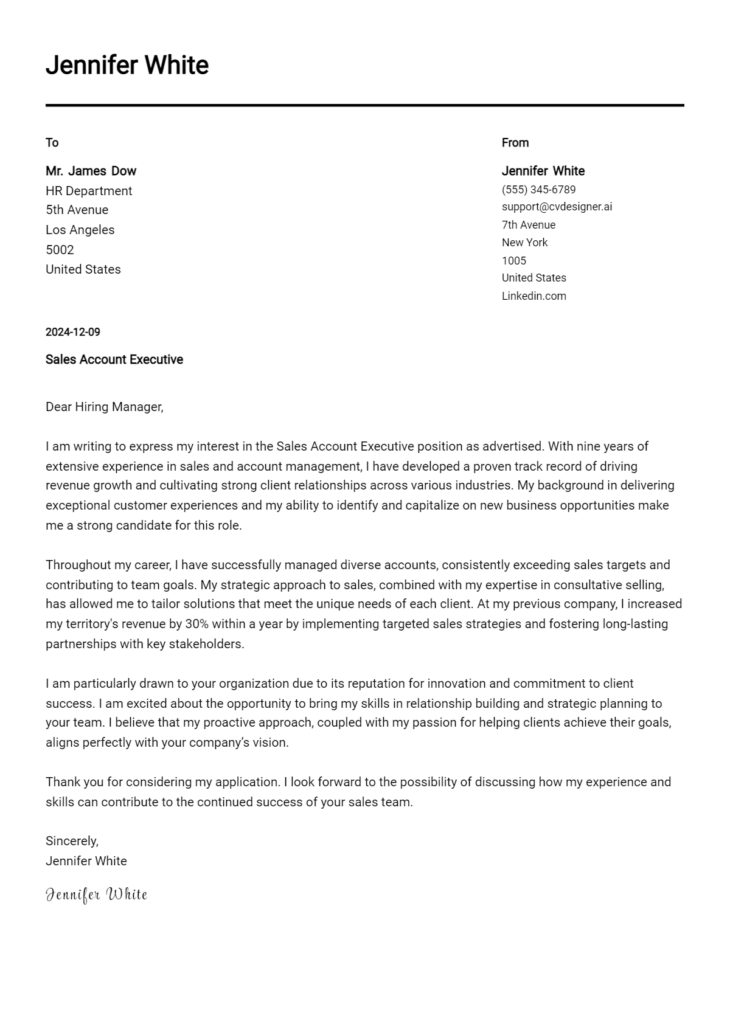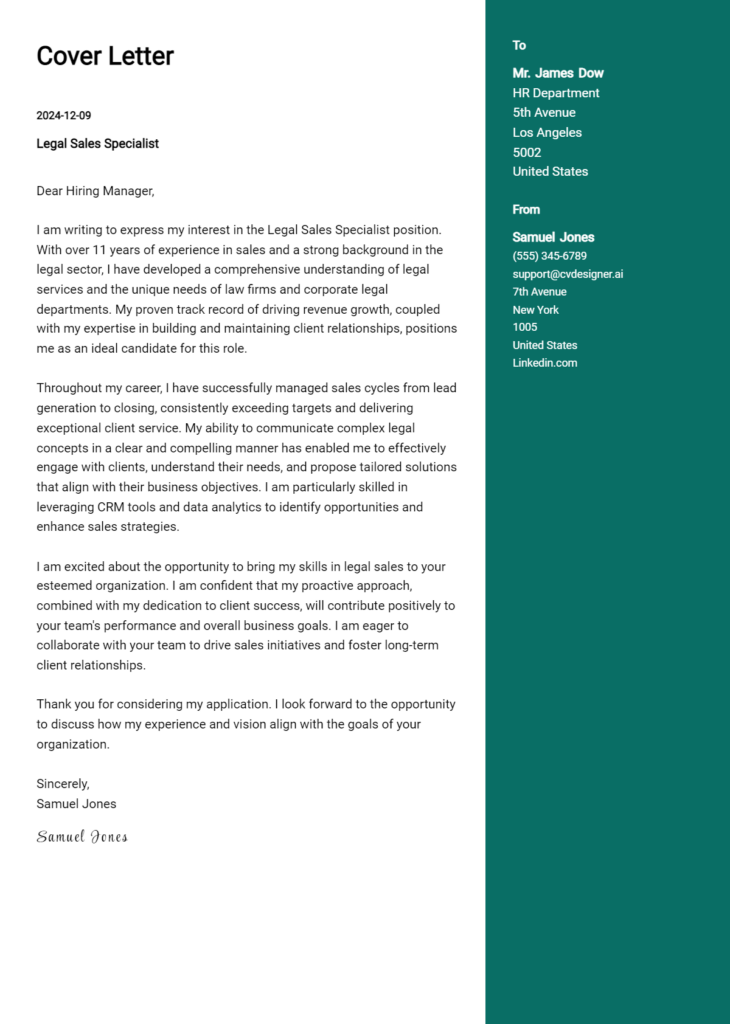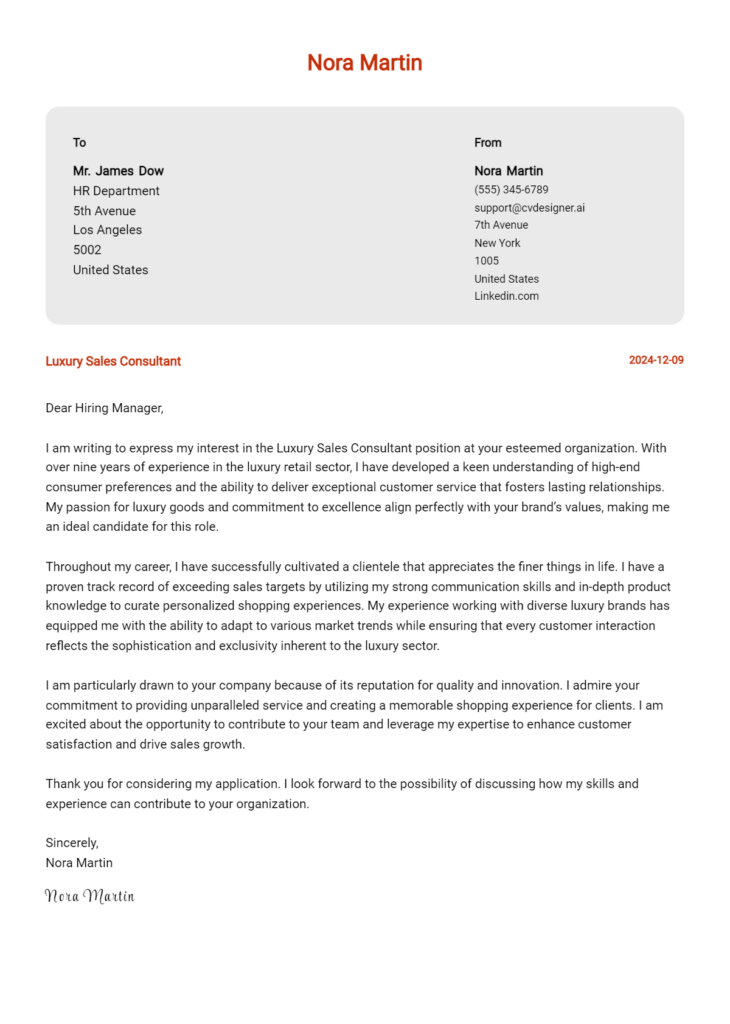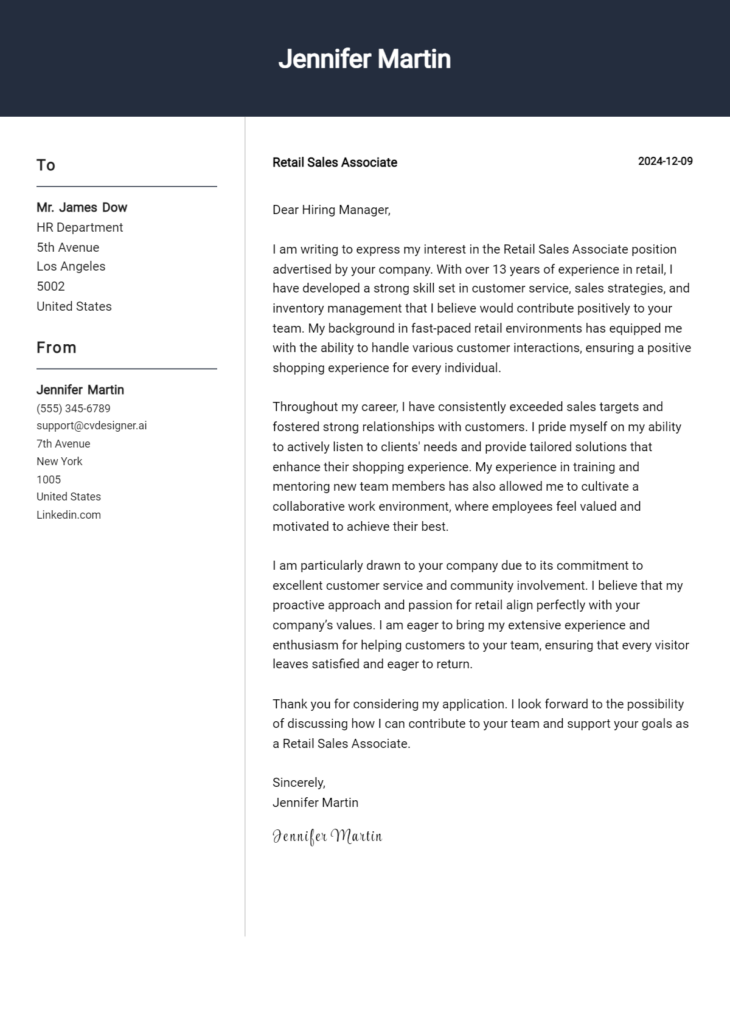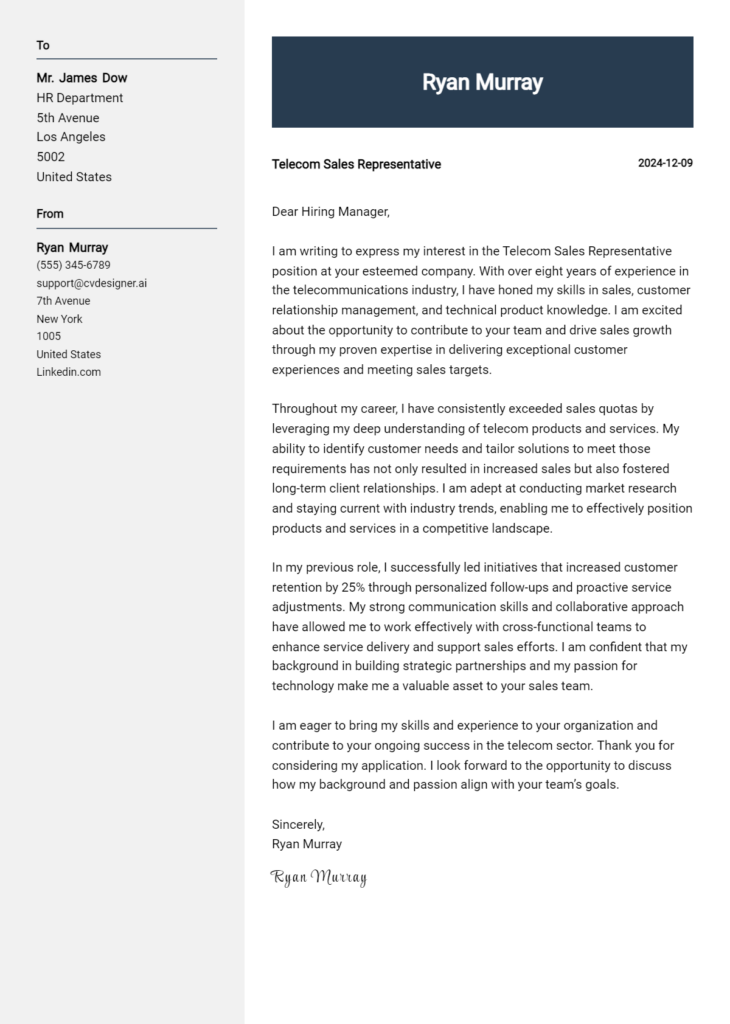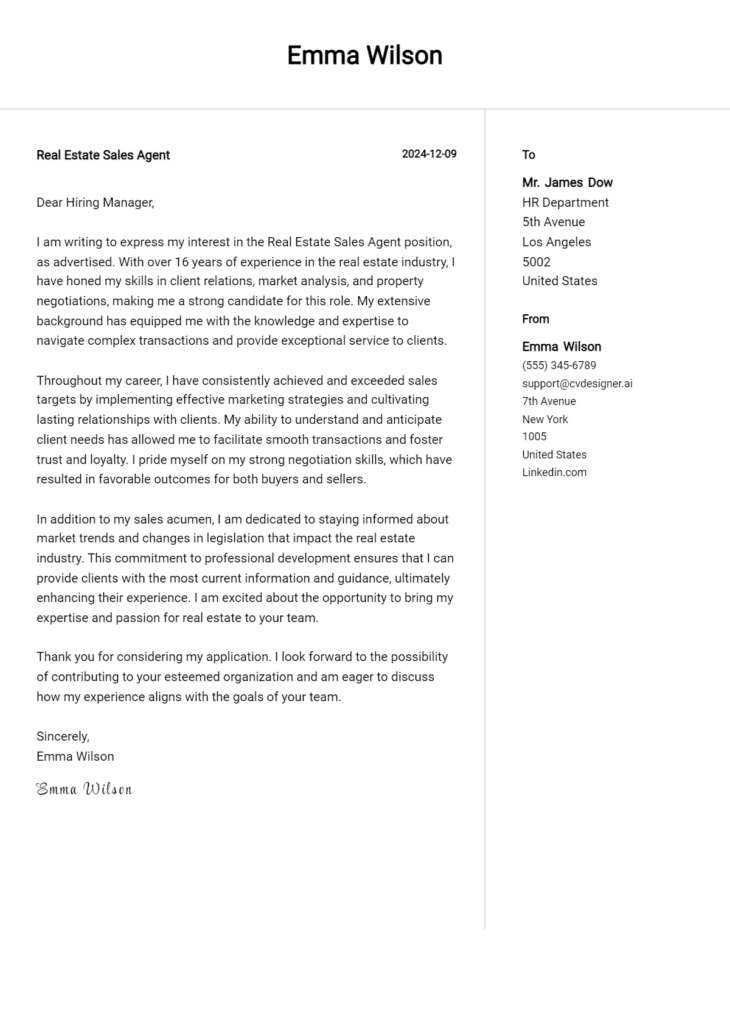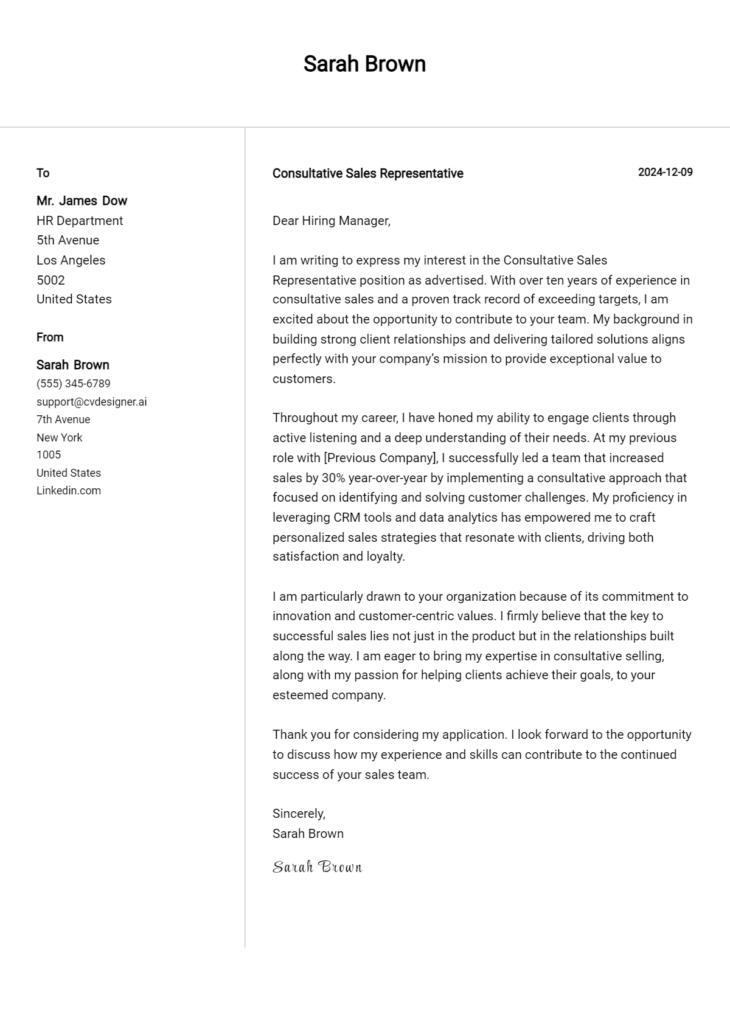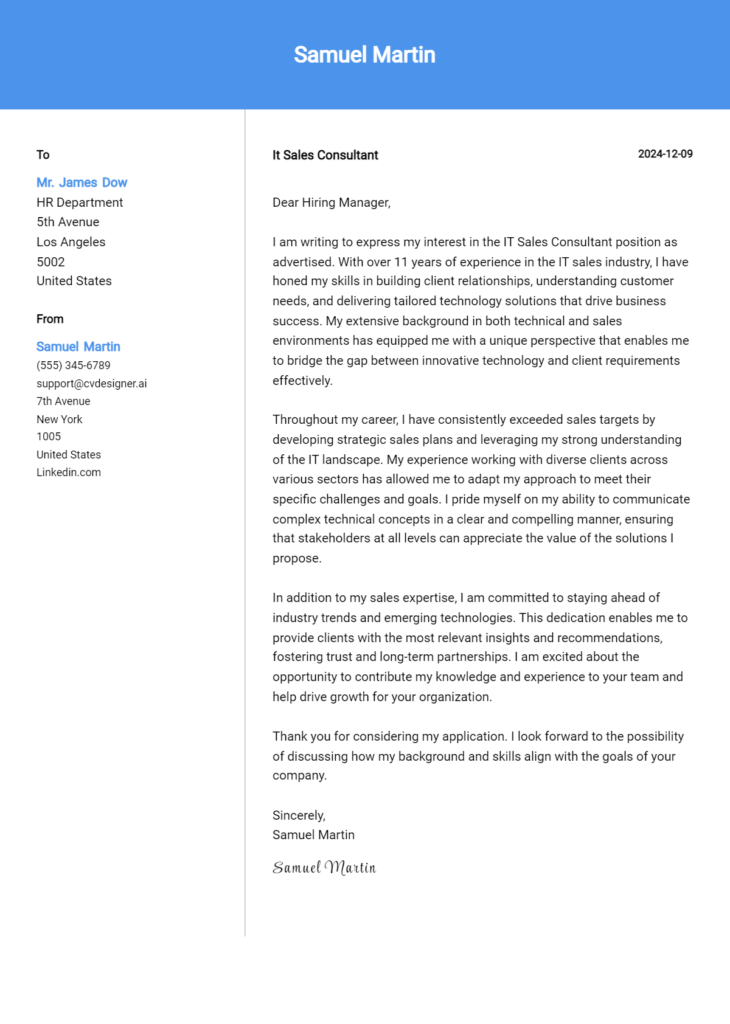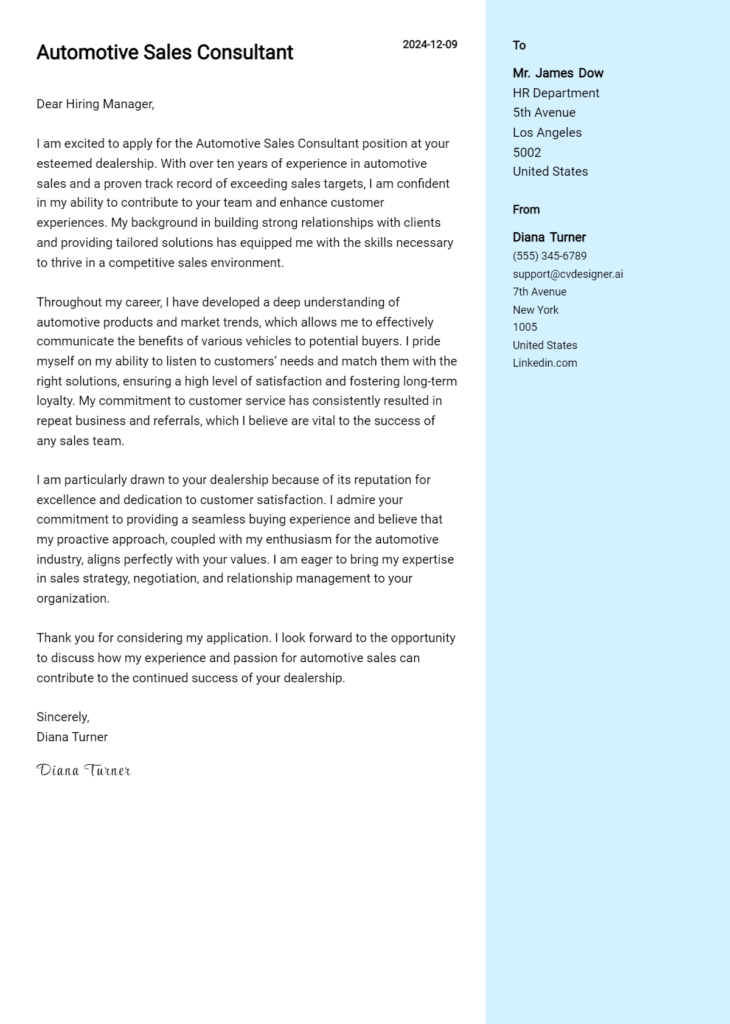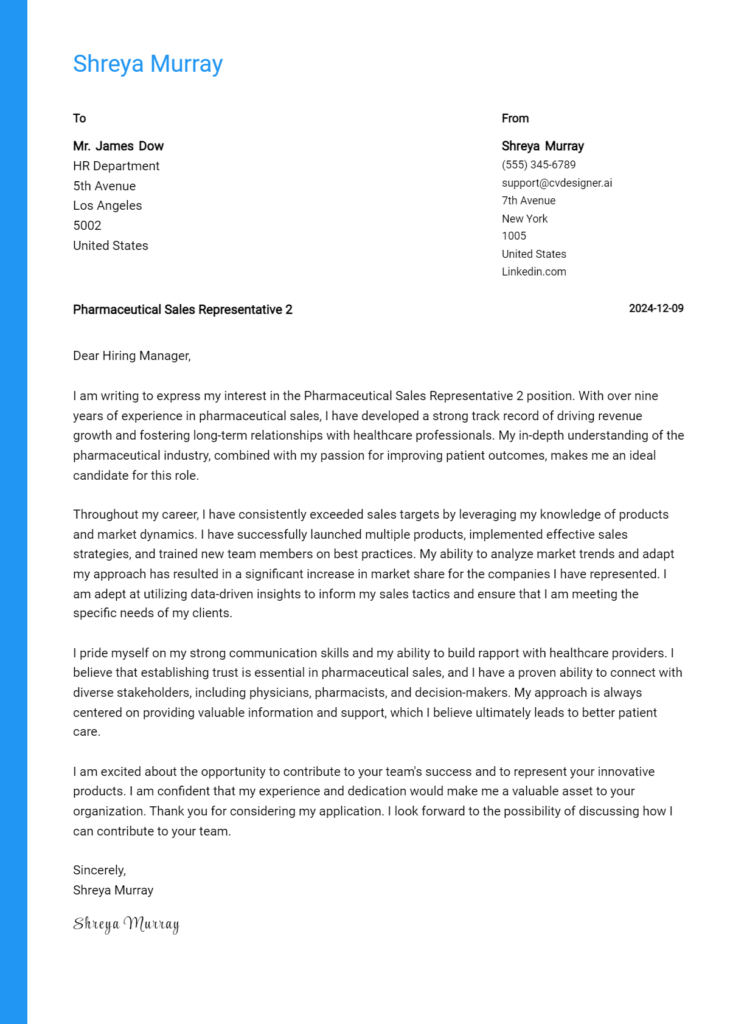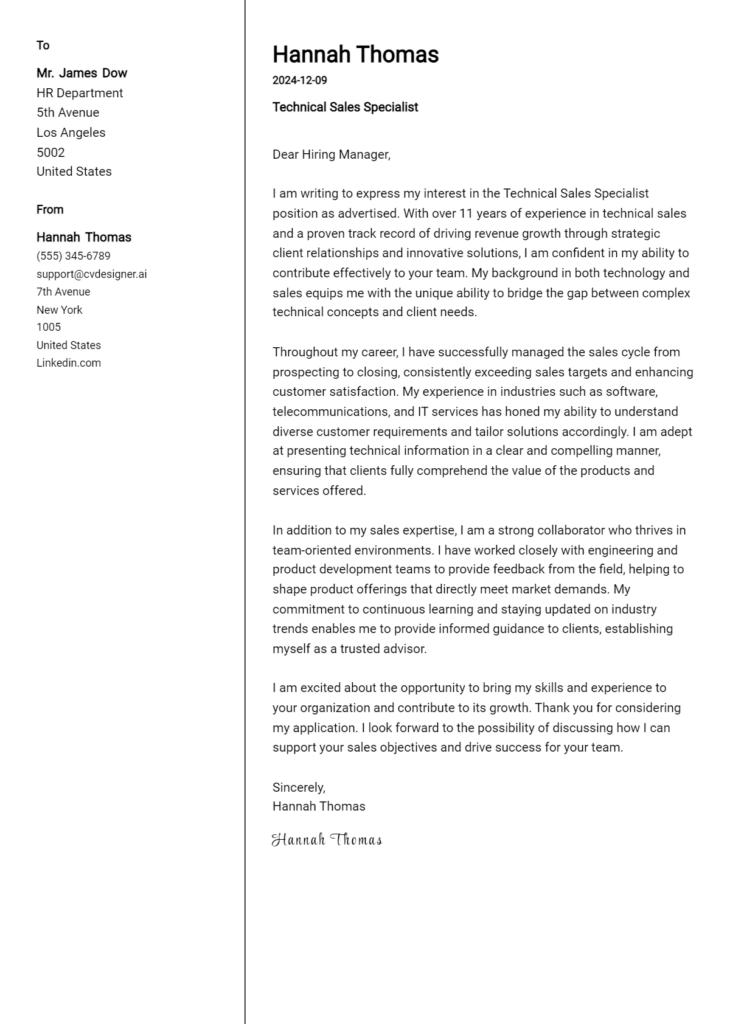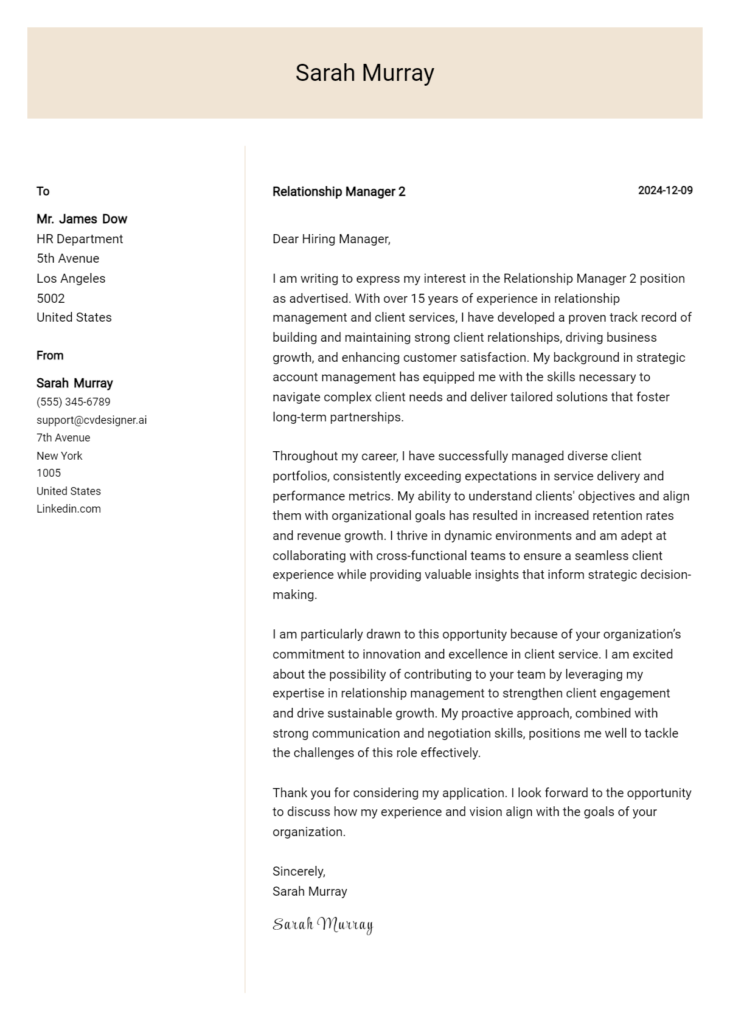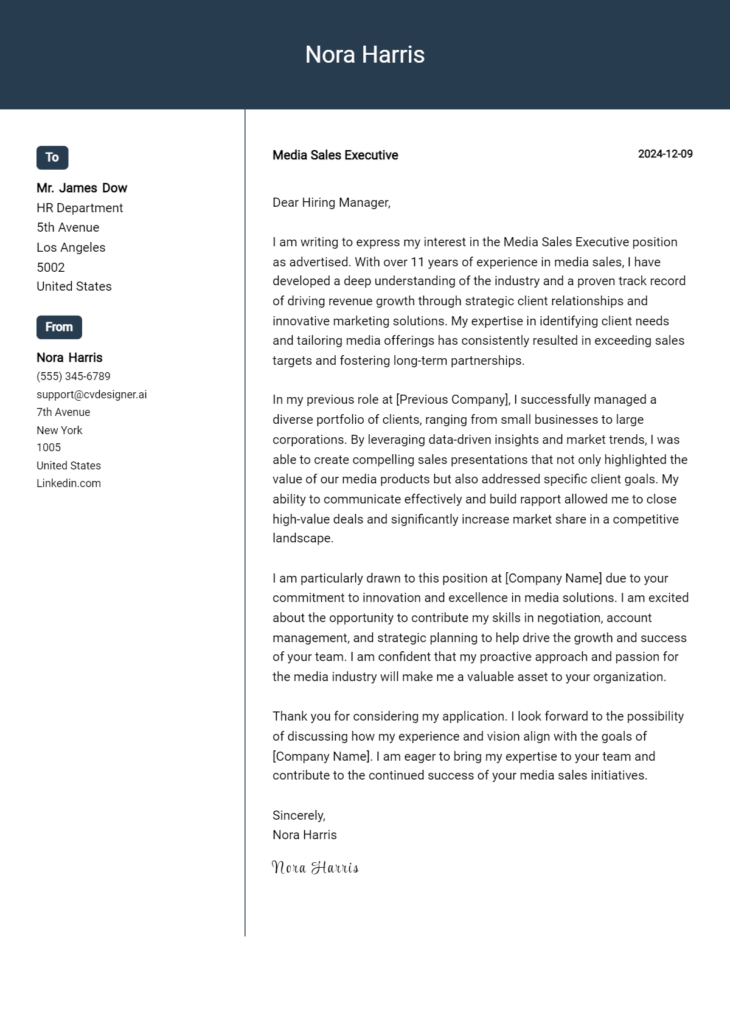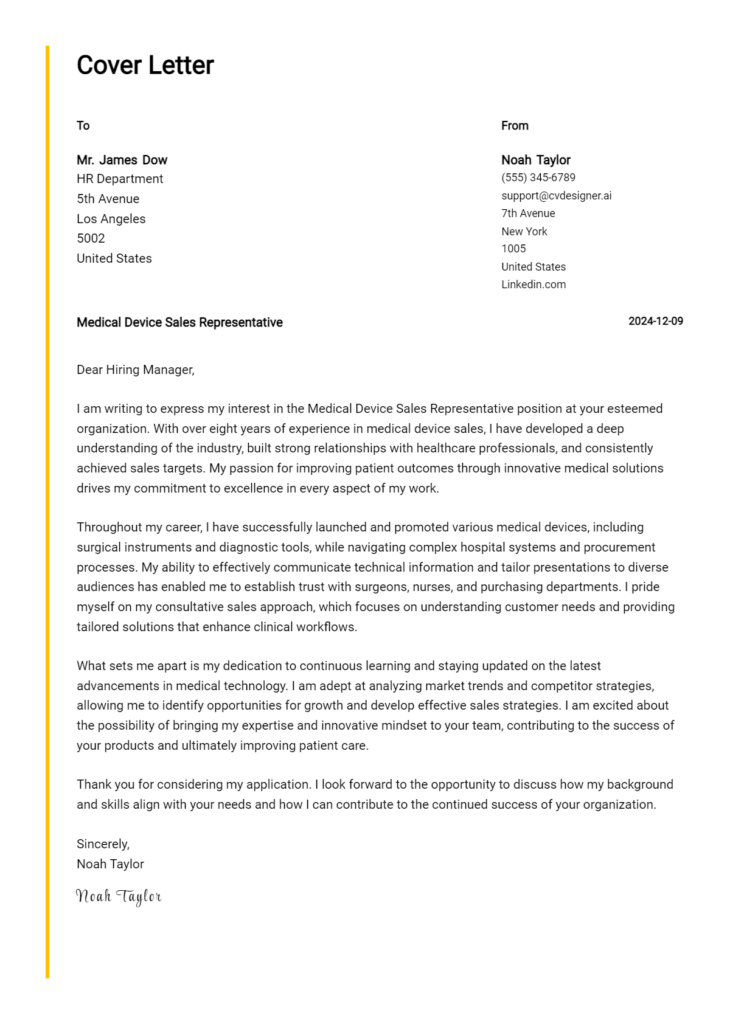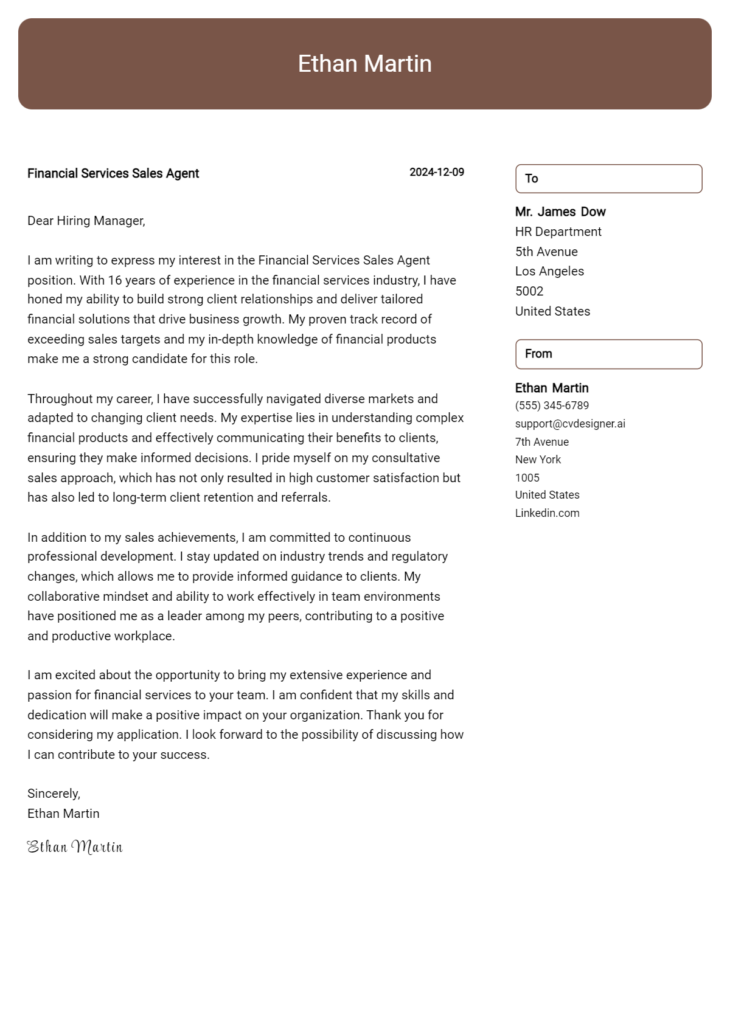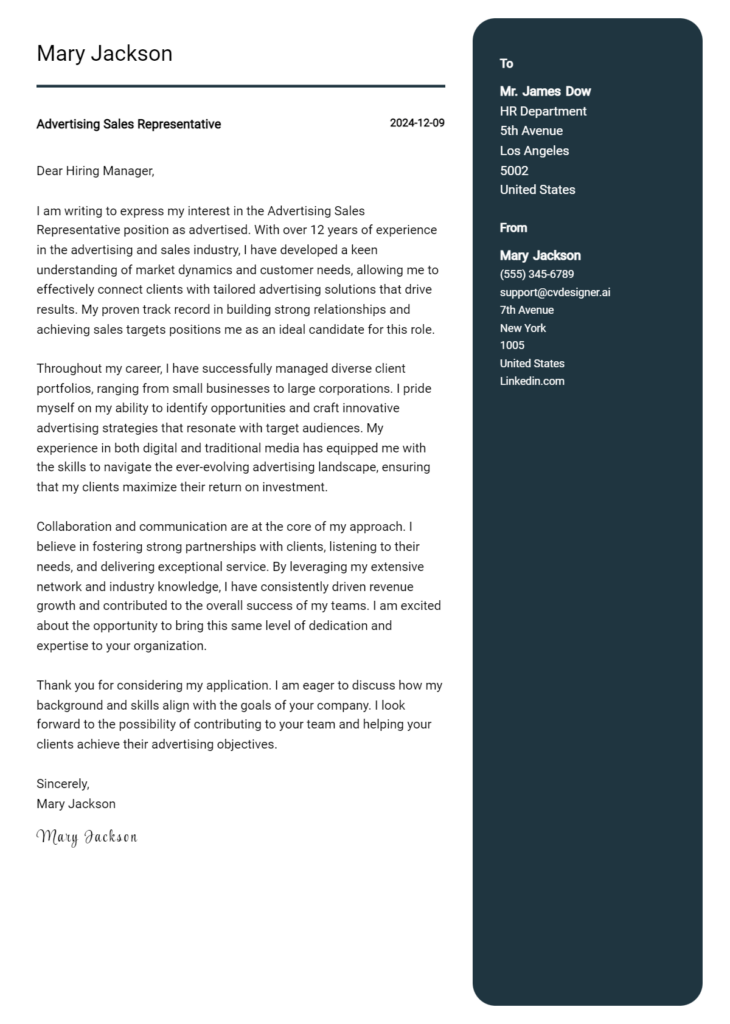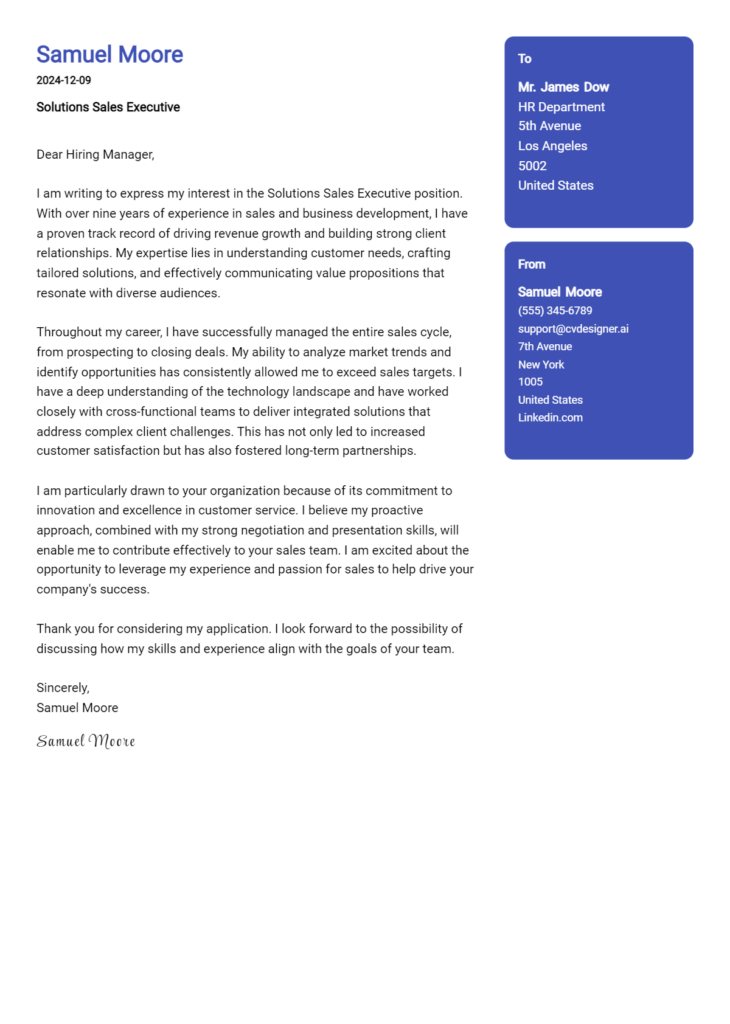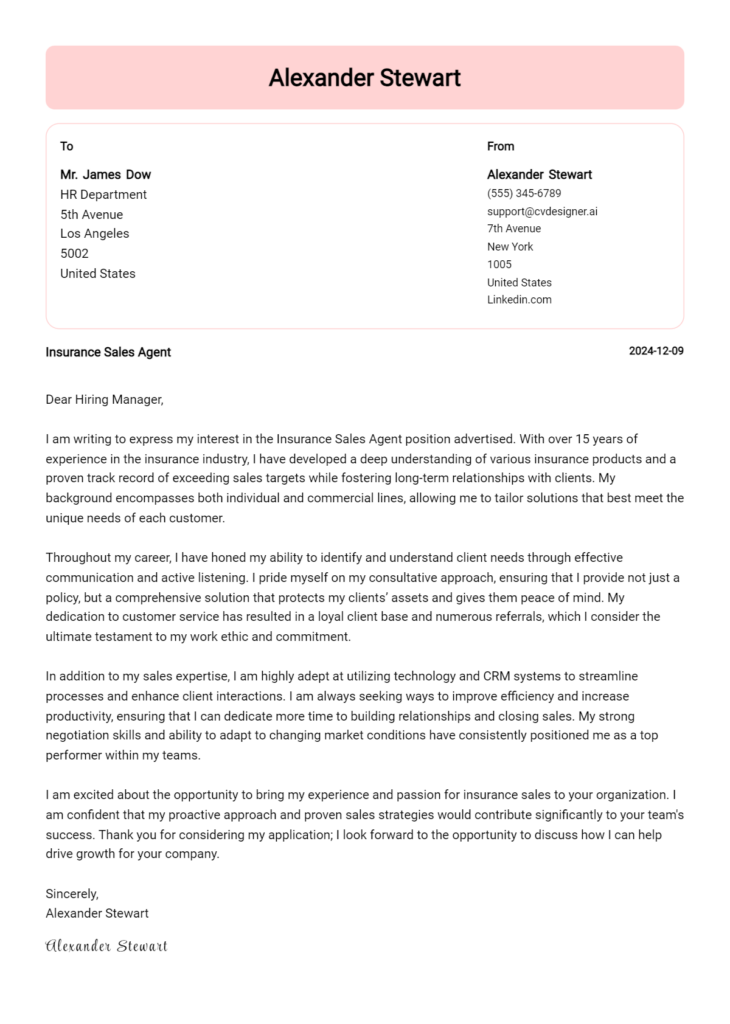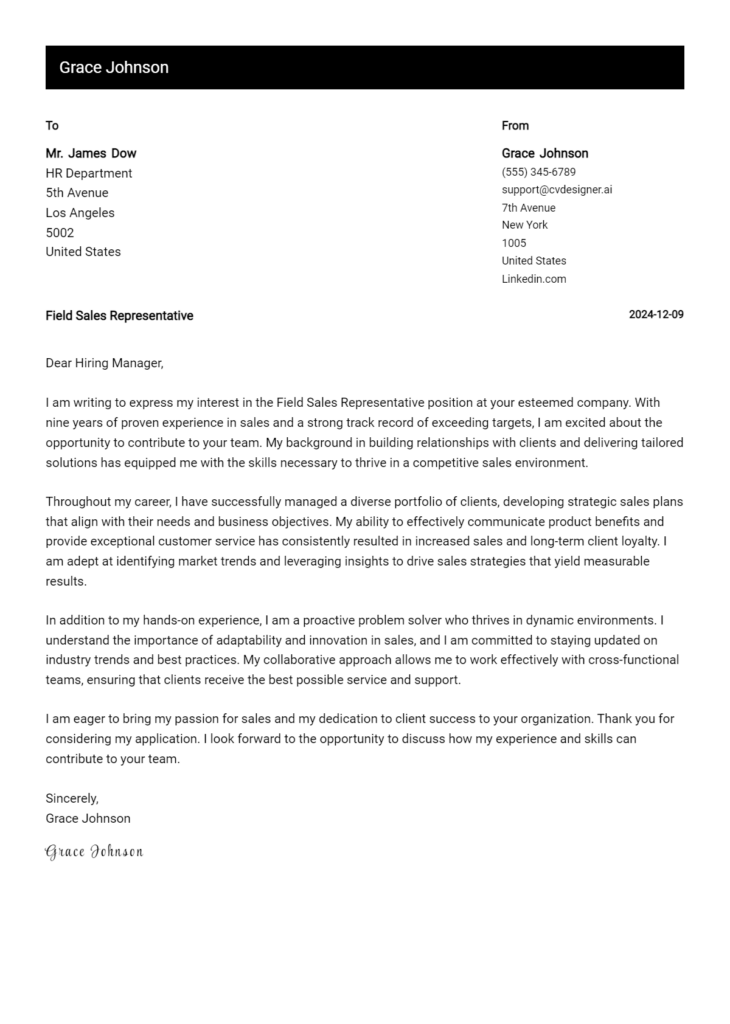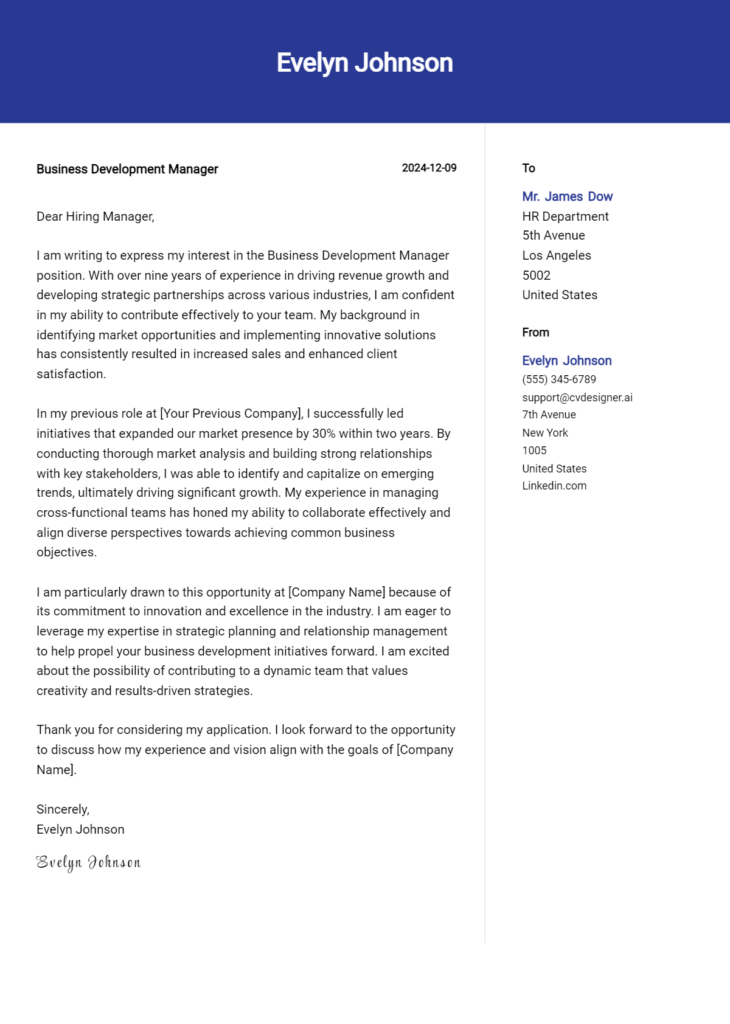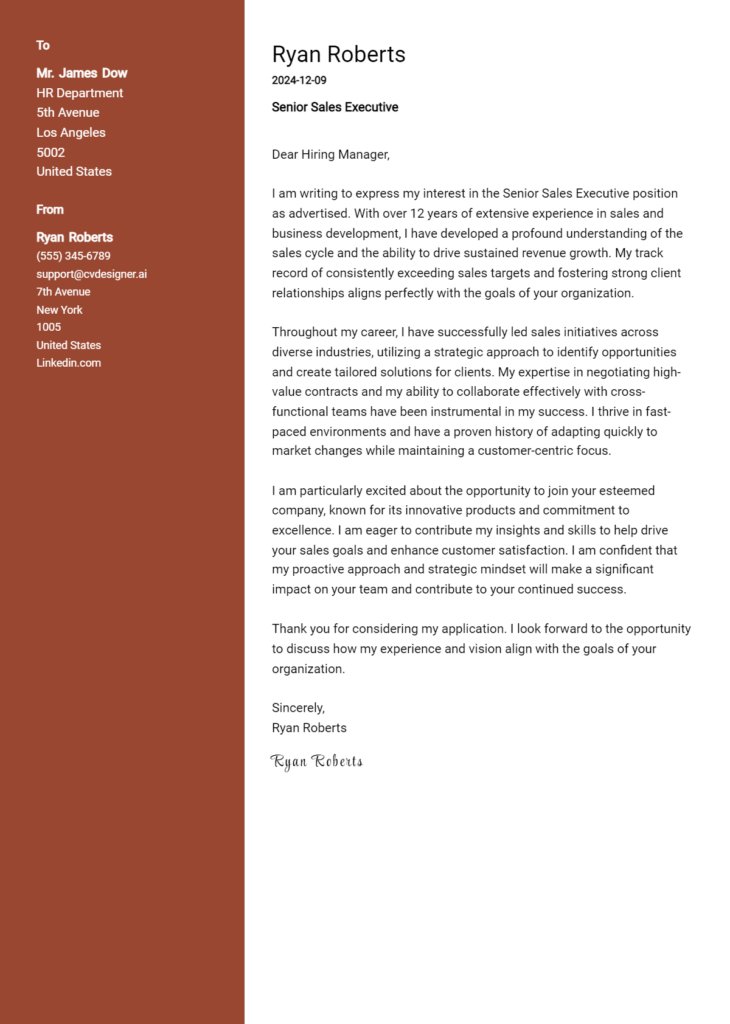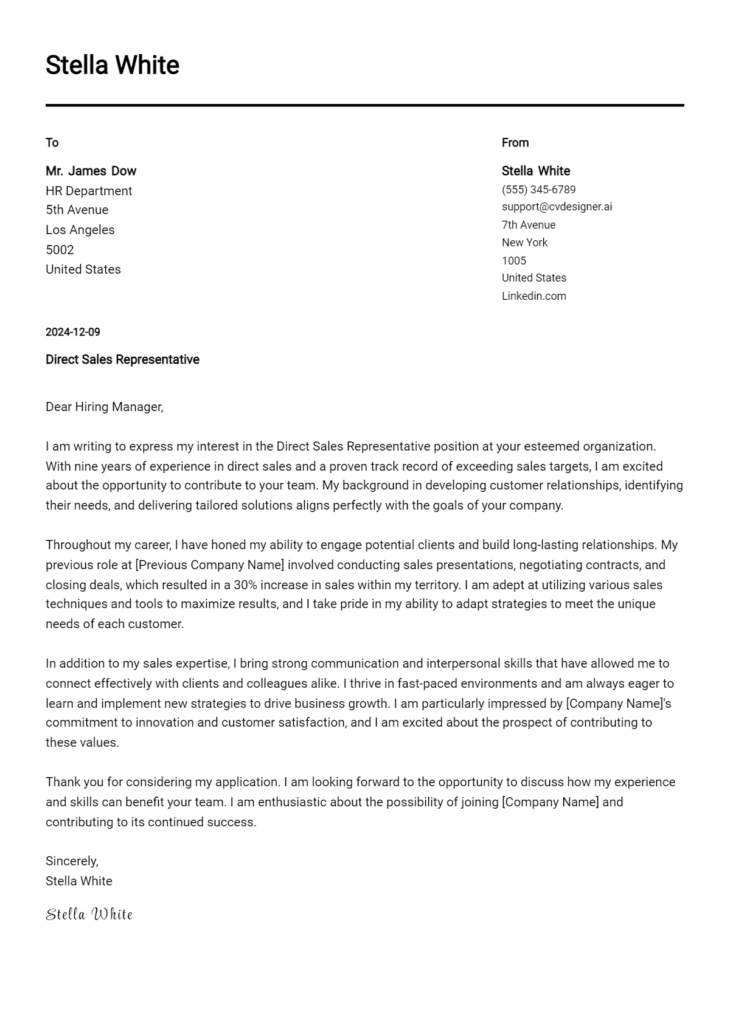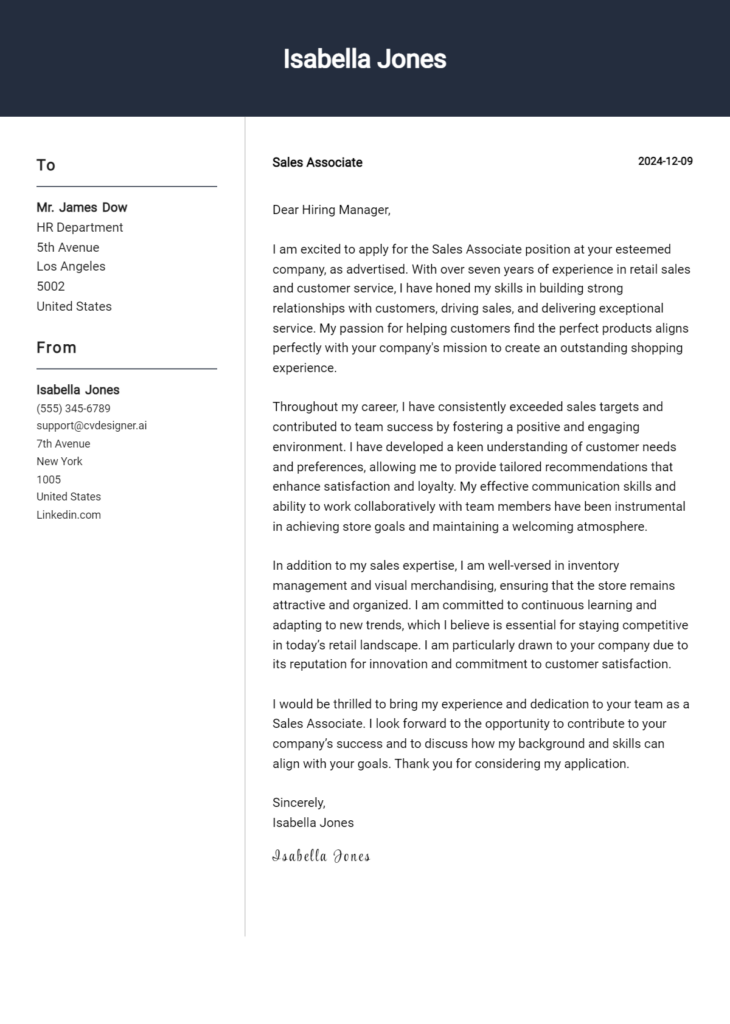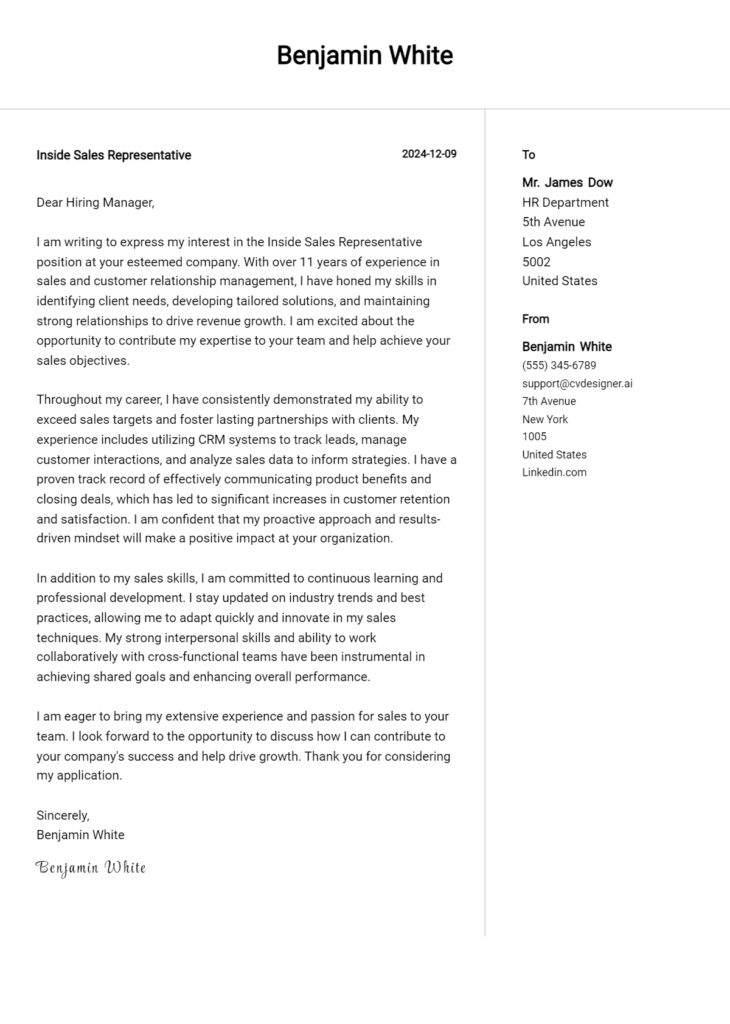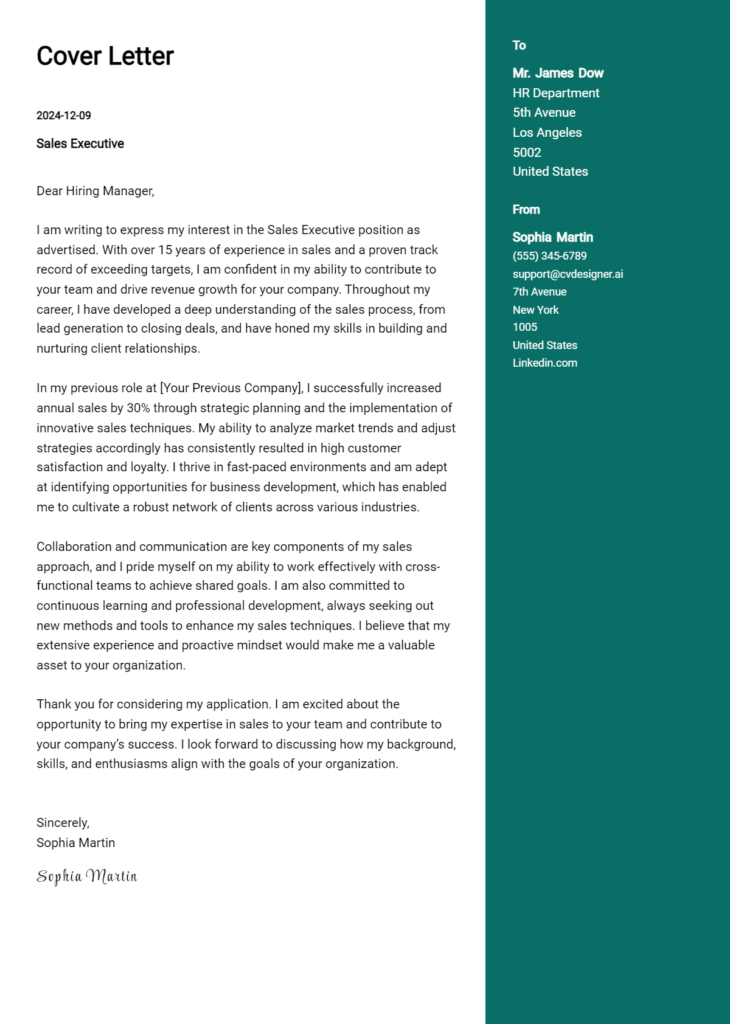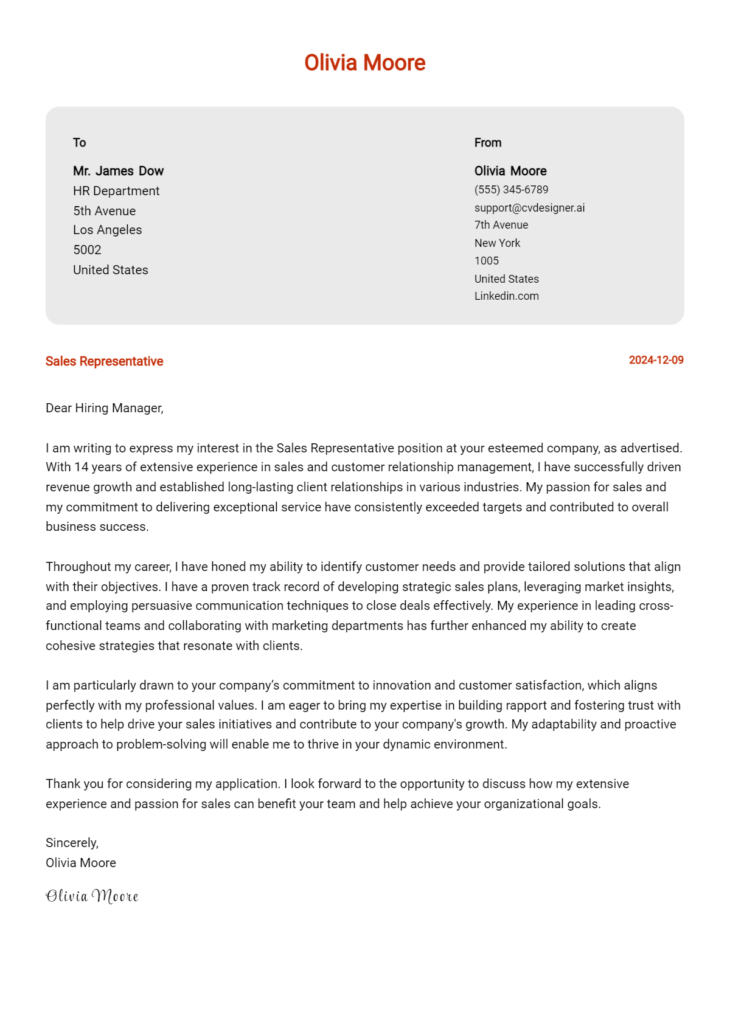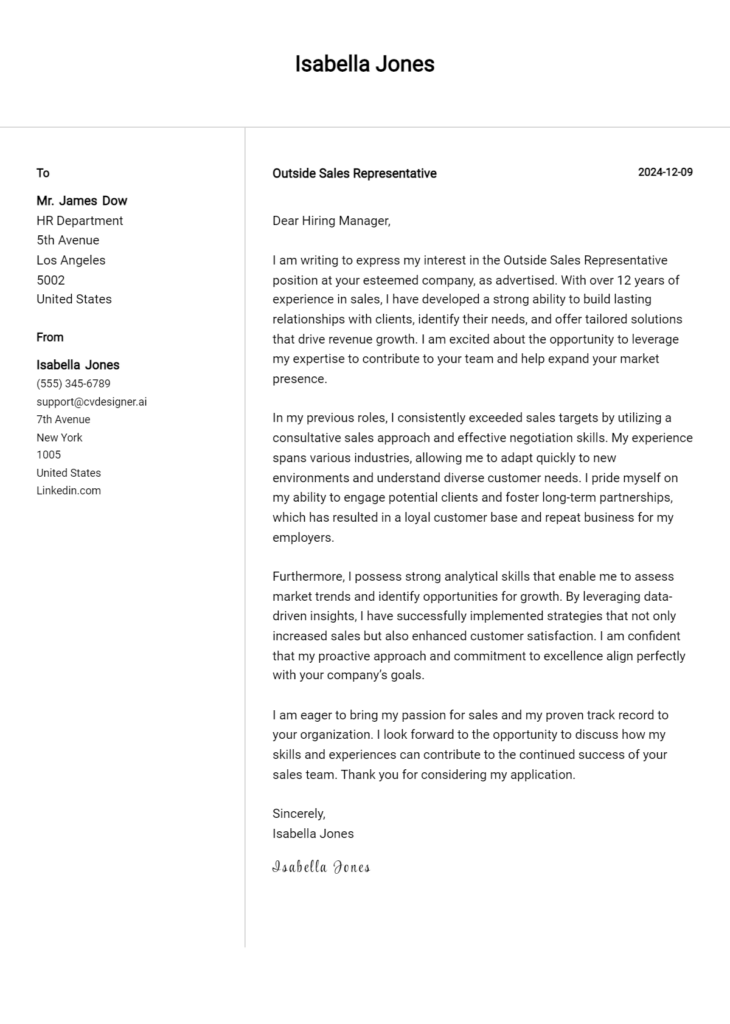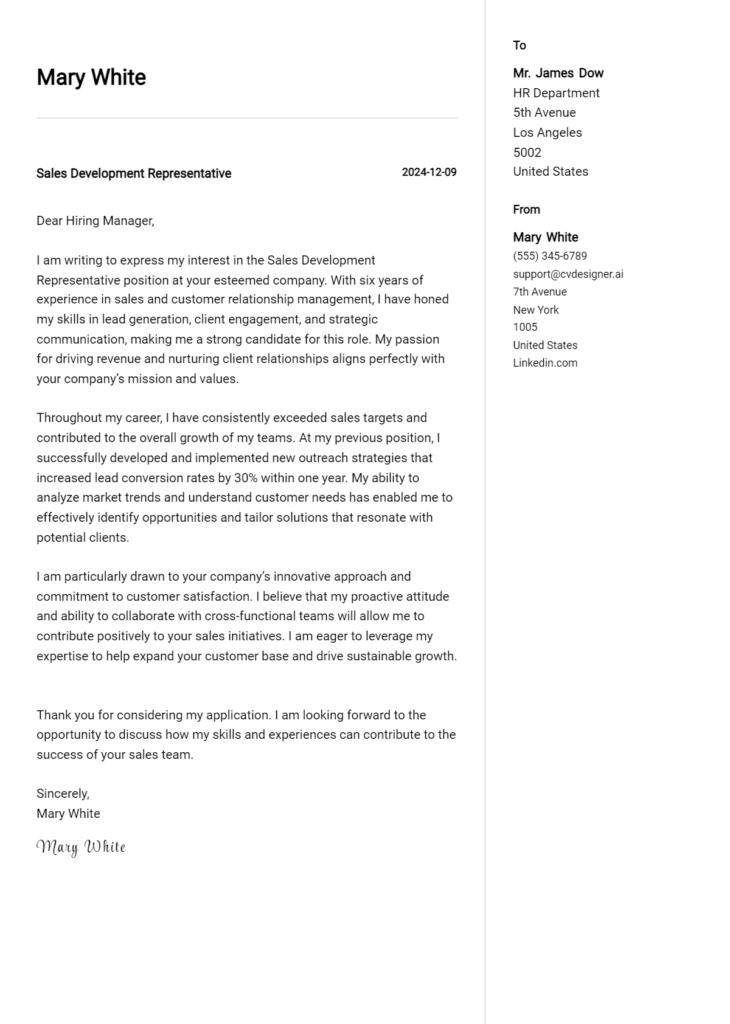Business Development Representative Cover Letter Examples
Explore additional Business Development Representative cover letter samples and guides and see what works for your level of experience or role.
How to Format a Business Development Representative Cover Letter?
Crafting a well-structured cover letter is essential for a Business Development Representative, as it not only showcases your qualifications but also reflects your ability to communicate effectively and persuasively. The format of your cover letter is a critical aspect that can capture the attention of hiring managers, demonstrating your organizational skills and professionalism—qualities that are paramount in business development roles.
In this guide, we’ll explore how to format your cover letter to make an impactful impression. We’ll provide insights and examples tailored specifically for business development professionals to enhance your application.
We will focus on the key components of a professional cover letter, including:
- Cover Letter Header
- Cover Letter Greeting
- Cover Letter Introduction
- Cover Letter Body
- Cover Letter Closing
Each section serves a unique purpose in emphasizing your qualifications and showcasing your eagerness for the role. Let’s delve into the details of each part to help you create a standout cover letter for your business development career.
Importance of the Cover Letter Header for a Business Development Representative
The cover letter header plays a crucial role in establishing professionalism and clarity in your application as a Business Development Representative. It serves as the first impression for potential employers, setting the tone for the rest of your document. A well-structured header should include your contact information, the date, and the recipient's details, ensuring that all parties can easily reach each other. The clarity of the header reflects your attention to detail and organizational skills, qualities that are essential in a business development role where communication and relationship-building are key.
Strong Example:
John Doe 123 Business St. Cityville, CA 12345 (123) 456-7890 john.doe@email.com October 1, 2023 Jane Smith Hiring Manager XYZ Corporation 456 Company Ave. Business City, CA 67890
Weak Example:
Hey! This is John Doe. Just wanted to apply for the BDR job. See ya!
The Importance of the Cover Letter Greeting
The greeting of your cover letter serves as the first point of contact with the hiring manager and sets the tone for the rest of your message. A well-crafted greeting not only demonstrates professionalism but also shows that you have taken the time to personalize your application. By addressing the hiring manager directly, you create an immediate connection that can make your letter stand out in a sea of generic applications. To avoid sounding impersonal, steer clear of generic greetings such as "To Whom It May Concern." Instead, take the time to research the recipient's name through the company's website or LinkedIn. This small effort can significantly enhance the impact of your cover letter.
Strong Greeting Example
Dear Ms. Johnson,
Weak Greeting Example
To Whom It May Concern,
Importance of a Well-Crafted Cover Letter Introduction for a Business Development Representative
A compelling cover letter introduction is crucial for a Business Development Representative, as it sets the tone for the entire application and can significantly influence the hiring manager’s perception. This introductory paragraph should not only capture attention but also clearly express the candidate’s enthusiasm for the role and demonstrate relevant skills or achievements that align with the job requirements. A strong introduction serves as a hook, enticing the reader to learn more about the candidate, while a weak introduction can lead to disinterest and a missed opportunity. Below are examples of both strong and weak introductions to illustrate the difference.
Strong Example
Dear [Hiring Manager's Name], I am excited to apply for the Business Development Representative position at [Company Name] as advertised on [Job Board]. With over three years of experience in driving sales growth and forging strategic partnerships, I have consistently exceeded targets by up to 40%. My proven ability to connect with clients, understand their needs, and offer tailored solutions aligns perfectly with your mission to expand market reach. I am eager to bring my passion for relationship-building and innovative approach to your dynamic team.
Weak Example
Hello, I am writing to apply for the Business Development Representative job. I think I would be good at it because I have done sales before. I hope you consider my application.
Purpose of the Cover Letter Body for a Business Development Representative
The cover letter body for a Business Development Representative serves as a critical platform for candidates to effectively convey their relevant skills, experiences, and the unique value they can bring to a prospective employer. This section should highlight specific projects or accomplishments that demonstrate the candidate's ability to drive growth, build relationships, and contribute to the company's success. By showcasing quantifiable results, such as the successful closing of deals or the development of strategic partnerships, candidates can create a compelling narrative that aligns their background with the needs of the company.
Strong Example
As a Business Development Representative at XYZ Corp, I successfully led a team initiative that increased our client acquisition rate by 30% over six months. By implementing a targeted outreach strategy and leveraging CRM tools, I was able to identify and engage with high-potential leads, resulting in the closure of several key accounts. Additionally, I developed a comprehensive training program for new hires, which improved their ramp-up time by 20%, thereby enhancing overall team productivity. My passion for building relationships and understanding client needs aligns perfectly with your company's mission to deliver exceptional service and innovative solutions.
Weak Example
I have some experience in business development and I think I would be a good fit for your company. I once worked with a team that tried to get more clients, but I didn’t really have a significant role. I believe I can contribute to your team since I have some knowledge about sales. I am looking for a job in a company like yours because I need work.
The Importance of the Cover Letter Closing for a Business Development Representative
The closing paragraph of a cover letter is crucial as it encapsulates your qualifications and reiterates your enthusiasm for the position. For a Business Development Representative, this section should effectively summarize your relevant skills while expressing your eagerness to contribute to the company’s growth. It also serves as a prompt for the hiring manager to take action, whether that’s reviewing your resume or scheduling an interview. A strong closing leaves a lasting impression and could set you apart from other candidates.
Strong Example
Thank you for considering my application for the Business Development Representative position at XYZ Company. With my proven track record in sales and relationship building, I am excited about the opportunity to contribute to your team. I believe that my skills in market analysis and customer outreach will help drive growth for your company. I look forward to the possibility of discussing my application further and am eager to provide additional insights during an interview. Please feel free to review my resume, and I hope to hear from you soon.
Weak Example
I hope you like my cover letter. I think I would be good for the Business Development Representative job. I have some experience, and it would be great to talk more about it. Please look at my resume if you want.
These tips will assist candidates in crafting an effective cover letter for a Business Development Representative position, showcasing the skills and qualities that employers value most. A well-written cover letter should highlight your technical expertise, problem-solving abilities, knowledge of the Software Development Life Cycle (SDLC), teamwork experience, and a strong passion for continuous learning. By focusing on these areas, you can create a compelling narrative that demonstrates your fit for the role.
Tips for Crafting an Effective Cover Letter
Highlight Your Technical Skills
Make sure to mention specific technical skills relevant to the role, such as proficiency in CRM software, data analysis tools, or project management methodologies. Illustrate how you have utilized these skills in previous roles or projects to drive business growth or improve processes.Demonstrate Problem-Solving Abilities
Employers value candidates who can navigate challenges effectively. Share specific examples of how you identified a problem, developed a solution, and implemented it successfully. This not only showcases your analytical thinking but also your ability to contribute positively to the team's objectives.Show Your Knowledge of SDLC
If applicable, discuss your familiarity with the Software Development Life Cycle and how it relates to business development. Mention any experiences where you collaborated with technical teams to align business goals with development processes, showcasing your understanding of both domains.Emphasize Teamwork and Collaboration
Business development often involves working closely with cross-functional teams. Provide examples of successful collaborations, highlighting your role in fostering teamwork and communication. Emphasizing your ability to work well with others can set you apart from candidates who focus solely on individual achievements.Express a Passion for Continuous Learning
The business landscape is always evolving, and a commitment to continuous learning is crucial. Discuss any professional development courses, certifications, or workshops you have undertaken to enhance your skills. This demonstrates your proactive approach to personal and professional growth.
For additional resources, consider exploring cover letter templates that can provide a solid foundation or use a cover letter builder to streamline the creation of your cover letter.
Common Mistakes to Avoid in a Business Development Representative Cover Letter
Crafting a compelling cover letter is essential for standing out as a Business Development Representative. Avoiding common mistakes can significantly enhance your chances of making a positive impression on potential employers. Here are some pitfalls to watch out for:
Generic Salutation: Using "To Whom It May Concern" can come off as impersonal. Always try to address the hiring manager by name. If unsure, a quick online search or a call to the company can help.
Repetitive Content: Simply reiterating your resume without adding new information is a missed opportunity. Use the cover letter to elaborate on specific experiences that relate to the role and demonstrate your unique value.
Lack of Customization: A one-size-fits-all approach can be detrimental. Tailor your cover letter to reflect the specific job description and company culture. For inspiration, check out some cover letter examples.
Failure to Highlight Achievements: Don't just list responsibilities; showcase your accomplishments with quantifiable results. Use metrics to illustrate how you've positively impacted past employers.
Poor Formatting: A cluttered or unprofessional layout can detract from your content. Follow a clear cover letter format to ensure your letter is easy to read and visually appealing.
Neglecting the Closing: Conclude with a strong closing statement expressing your enthusiasm for the role and a call to action, such as expressing your desire for an interview.
Spelling and Grammar Errors: Typos can undermine professionalism. Always proofread your letter or use tools to check for errors before submission.
By steering clear of these common mistakes, you can create a powerful cover letter that effectively communicates your qualifications and enthusiasm for the Business Development Representative position.
Cover Letter FAQs for Business Development Representative
What should I include in my cover letter for a Business Development Representative position?
In your cover letter, it's essential to highlight your relevant skills and experiences that align with the responsibilities of a Business Development Representative. Start with a strong introduction that captures attention, briefly mentioning your interest in the position and the company. Include specific examples of past achievements, such as successful lead generation, sales growth, or client relationship management. Emphasize your ability to communicate effectively and work collaboratively with teams. Additionally, showcase your understanding of the company's market and needs, demonstrating that you’ve done your research. Finally, conclude with a strong closing statement that expresses your enthusiasm for the role and your desire for an interview.
How can I tailor my cover letter to a specific company?
To tailor your cover letter, research the company’s mission, values, and recent developments. Start by addressing the letter to a specific person, such as the hiring manager, to create a personal touch. Mention the company's name and specific projects or initiatives that resonate with you. For instance, if the company recently expanded into a new market, discuss how your experience aligns with that initiative. Incorporate keywords from the job description to highlight relevant skills and experiences. This demonstrates that you understand the company’s needs and how you can contribute. Personalizing your cover letter shows genuine interest and can set you apart from other candidates.
How long should my cover letter be for a Business Development Representative role?
A cover letter for a Business Development Representative role should ideally be one page long, typically consisting of three to four paragraphs. The goal is to be concise while effectively communicating your qualifications and enthusiasm for the position. Aim for around 250-400 words, ensuring that every sentence adds value to your application. Use a professional tone and keep it focused on your relevant skills and experiences. Avoid lengthy explanations or unnecessary details; instead, emphasize key achievements and how they relate to the job. A well-structured cover letter that respects this length will make a positive impression and show that you can convey your message clearly.
What common mistakes should I avoid in my cover letter?
When writing your cover letter, avoid common mistakes such as generic language or a one-size-fits-all approach. Ensure your letter is free from spelling and grammatical errors, as these can undermine your professionalism. Avoid being overly formal or using jargon that may not resonate with the hiring team. Additionally, steer clear of lengthy paragraphs; instead, use clear and concise sentences to maintain the reader's interest. Don’t just reiterate your resume; instead, use the cover letter to showcase your personality and enthusiasm for the role. Finally, remember to include a compelling call to action, inviting the reader to discuss your application further.
Build your Cover Letter in minutes
Use an AI-powered cover letter builder and have your letter done in 5 minutes. Just select your template and our software will guide you through the process.

